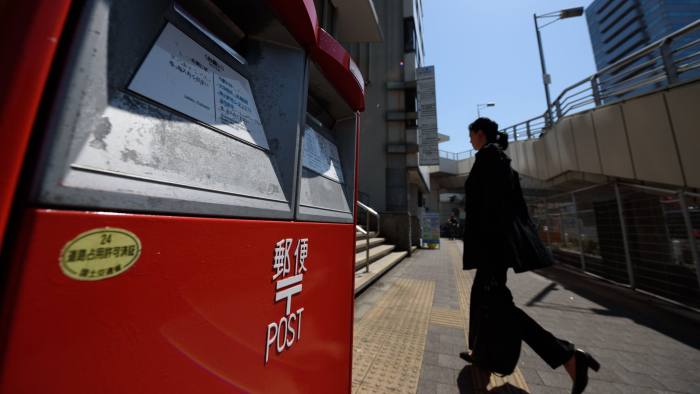Japan Post Holdings, which announced a loss in its first full year as a listed company, is poised to announce details of an estimated $12bn share sale, say people close to the process. It is the first equity offer from group since its record-breaking IPO two years ago.
Looming over the planned offering are rapidly escalating tensions on the Korean peninsula. Japan’s markets have so far reacted calmly to recent missile and nuclear tests carried out by North Korea, but analysts warn about a growing risk of a sharp market sell-off.
On Tuesday, Taro Aso, the Japanese finance minister, appeared to acknowledge the difficulty of executing a massive share sale in a nervous market. “If something happens in North Korea or on the peninsula, we will have to take various things into consideration, including any impact on share prices,” he told reporters.
The Ministry of Finance will offer the shares.
According to bankers and officials familiar with the sale, Japan Post is hoping to make an announcement on the deal early next week, with a view to pricing the offer in late September, completing the sale within a narrow “window” for large Japanese issuance that closes in early November.
Plans for the additional offering were confirmed earlier this year, with Nomura, Daiwa and Goldman Sachs named in March as the lead managers on the offer.
In 2015, as the culmination of a decade-long process to privatize the company that runs Japan’s largest bank, the largest insurer and largest single employer outside the civil service, the state sold 11 per cent of Japan Post, which in turn sold 11 per cent in its two financial subsidiaries.
The government originally set out to complete at least three batches of share sales, targeting a total of about $36bn to be spent on reconstruction work in areas hit by the 2011 tsunami.
Since the IPO, shares in Japan Post Insurance have managed to hold marginally higher than the price at which they listed. Shares in Japan Post Bank, which listed just a few months before the Bank of Japan introduced its negative interest rate policy in early 2016 that hurt the profits of Japanese banks, are almost 6 per cent below their listing price.
The worst performer of the trio has been the parent, Japan Post Holdings — a business that was always expected to struggle in its shrinking domestic market but which, in April this year, announced a ¥400bn ($3.6bn) write-down on its 2015 purchase of the Australian logistics group Toll. Shares in Japan Post Holdings are trading around 8.5 per cent below their launch price.
As in 2015, when the IPO created more than 1m new individual investors and was a key part of Prime Minister Shinzo Abe’s plans to entice younger Japanese to the stock market, a banker said a “very significant slab” of the latest allocation will go to retail investors. Despite the disappointing share price performance of the three Japan Post groups since IPO, the stocks’ hefty dividend should appeal to investors. Rumours of the planned announcement triggered a heavy sell-off of shares on Tokyo’s smaller-cap Mothers market — a proxy for the behaviour of the “Mrs Watanabe” retail investor at whom the Japan Post shares are expected to be pitched. Traders said the 4.65 per cent rout on Mothers on Tuesday represented a bet that large numbers of retail investors will start trimming their portfolios to raise funds to buy the Japan Post offering.
The article first appeared on FT.com.

